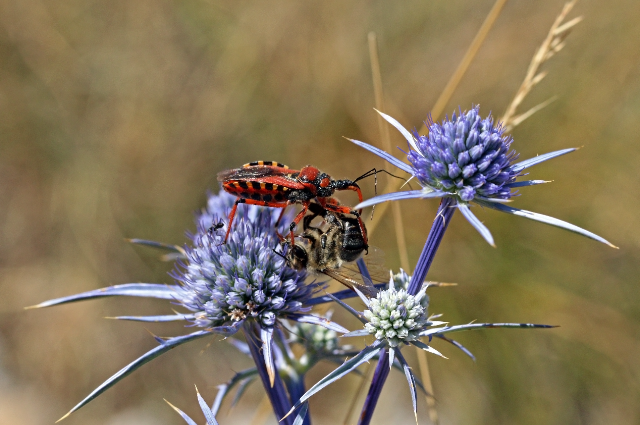Introduction
Tea gardens in Assam are adopting an innovative biological method to combat pest infestations by leveraging the predatory abilities of Reduviid Bugs. These inborn insects are being produced and strategically released to reduce reliance on chemical pesticides as a move expected to make tea cultivation more environmentally friendly and sustainable. The initiative led by the Tocklai Tea Research Institute (TTRI), offers a promising alternative to chemical pest control while protecting the delicate ecosystem of tea plantations.
The Role of Reduviid Bugs in Pest Control
Reduviid Bugs are natural predators known for their effectiveness in managing harmful pests. Among their primary targets are looper insects, notorious for damaging tea leaves and significantly affecting both the yield and quality of tea crops. TTRI's research has focused on connecting these bugs’ predatory instincts by increasing their population under controlled conditions. This approach not only curbs pest populations but also minimizes the environmental harm caused by excessive pesticide use.
Research and Implementation by TTRI
TTRI has conducted extensive laboratory experiments to rear Reduviid Bugs and study their impact on pest populations. Once a sufficient number of these beneficial insects were kept, they were released into select tea gardens across Assam as part of a pilot project. By introducing these bugs into the natural ecosystem, TTRI aims to create a self-regulating system where the bugs thrive and naturally keep pest populations in check.
Benefits of Biological Pest Control
According to A. Babu, the Director of TTRI, the institute is committed to non-chemical pest and disease control methods. He emphasized that biological control such as the use of Reduviid Bugs plays a key role in maintaining ecological balance. Excessive pesticide use, he explained disrupts this balance which is leading to long-term environmental damage. By collecting and rearing natural predators already present in the ecosystem, TTRI has developed a sustainable method to control pests while ensuring no additional chemicals are introduced into the plantations.
A Sustainable Future for Tea Cultivation
This initiative is a step towards promoting sustainable tea cultivation in Assam. The success of Reduviid Bugs as a biological control agent could significantly reduce the dependence on chemical interventions, preserving soil health, safeguarding biodiversity and ensuring higher quality tea production. As tea plantations increasingly adopt eco-friendly practices, TTRI’s innovative approach could serve as a model for sustainable agriculture in other regions and crops.
Advancements in Sustainable Tea Production
In the global tea industry, strict regulations govern the use of pesticides to ensure the safety and quality of tea products. To address these concerns, innovative methods such as biological control are being adopted which can significantly decrease pesticide residues in tea leaves. This approach not only promotes environmental sustainability but also enhances the overall quality of tea.
The Role of Biological Control
At the Tocklai Tea Research Institute (TTRI), significant steps have been made in developing and commercializing microbial pesticides. This marks a groundbreaking achievement as it is the first instance in India where such microbial pesticides have been officially recognized under the Plant Protection Code (PPC). These advancements reflect a commitment to finding eco-friendly solutions to pest management in tea cultivation.
The Entomology Department at TTRI plays a crucial role in this initiative by focusing on the rearing and multiplication of beneficial insects that act as natural predators of pests. These insects have been released in various tea gardens across Assam and Bengal by demonstrating a practical application of biological control methods. Moreover, TTRI is dedicated to empowering local workers by providing them with training on how to rear these beneficial insects for mass production. This approach not only fosters sustainability but also enables small tea growers to adopt these practices by ensuring that they are not solely reliant on TTRI for support.
Training for Sustainability
The emphasis on training is vital. By equipping garden workers with the necessary skills to produce these natural predators, a self-sustaining system can be established. This means that even small-scale tea producers can benefit from biological control methods by enhancing their productivity while minimizing chemical pesticide use.
Focus on Reduviid Bugs
Preeti Ekka, a Research Associate in Entomology at TTRI highlights the specific implementation of Reduviid bugs as a biological control agent against pest issues in tea cultivation. This research initiative began during the 2015 study cycle and involved collecting these insects from their natural habitat and experimenting with various diets for optimal rearing conditions. Initially, they were fed on Hyposidra talaca, but for more effective mass production, the focus shifted to using Corcyra and termites as their primary food sources.
The integration of biological control methods in tea cultivation not only aligns with international standards for pesticide use but also supports sustainable agricultural practices. By training local workers and utilizing beneficial insects like Reduviid bugs, the tea industry can move towards a greener future while maintaining high-quality production standards.
The journey towards sustainable tea production has taken an exciting turn with the release of beneficial insects in various tea gardens. This initiative aims to enhance pest management while minimizing the reliance on chemical pesticides by ultimately leading to healthier tea crops.
So far, these beneficial insects have been introduced into two organic tea gardens: Hatikhuli Tea Garden in Assam and Makaibari Tea Estate in Darjeeling. These gardens are known for their commitment to organic farming practices, making them ideal entrants for testing the effectiveness of biological control methods. In addition to these organic sites, the insects have also been released in several commercial tea gardens throughout Assam. Notable locations include Bokahola Tea Estate, Meleng Tea Estate, and Hunuwal Tea Estate, among others. This broad approach allows for a comprehensive evaluation of how well these insects can function in different farming environments.
. . .
References:

